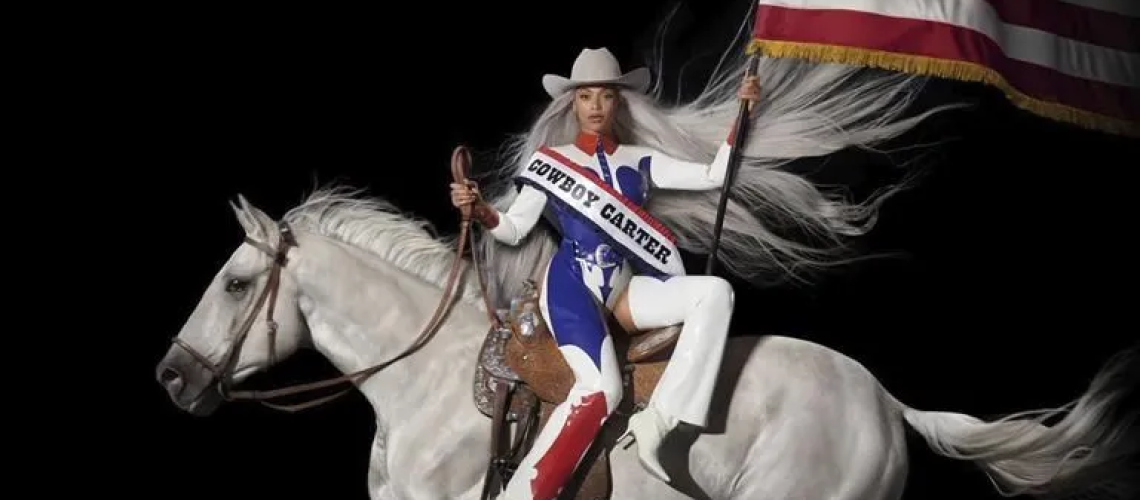Cowboy Carter has paved the way for a new era of country music – educating the masses on its history and removing the narrative of ‘nationalism’ from the genre.
“Genres are a funny little concept, aren’t they?” The words of the first commercially successful black female artist in country music, Linda Martell’s words, echo at the beginning of the track ‘Spaghetti’ on Beyoncé’s new country album, Cowboy Carter. “In theory, they have a simple definition that’s easy to understand. But in practice, well, some may feel confined.”
For a long time, country music has been a very tight and close-knit box – one hard to break into, especially if you don’t look like the other folks in the box – male and white.
With the number one spot on the country music charts, Beyoncé has already made her presence very well-known to the large portion of country music listeners who consider themselves ‘patriots’ or ‘conservative nationalists’ – and they’re not happy, to say the least. This isn’t the first time Beyoncé has faced backlash for trying to enter the genre, and it won’t be the last.
It was 2016, the nation was starting to divide during an election year, tensions were high, and Beyoncé teamed up with the Chicks to give us one of the most impactful moments in pop culture history. As she performed her song Daddy Lessons with the all-female country band, cameras panned to a crowd that looked less than pleased with the performers on the stage before them.
“As soon as I heard those horns begin playing and heard Beyoncé say the word ‘Texas,’ I knew that we at the CMAs were in for the treat of her performing her then-hit ‘Daddy Lessons,’” said Tanner Davenport in an MSNBC article reflecting on his memory of Beyoncé’s induction into the genre.
He was already excited to see the Chicks make their comeback, especially after being blacklisted from the country music industry back in 2003 after they made anti-George Bush comments regarding his handling of 9/11. But to see the Chicks with Beyoncé? He couldn’t ask for a better performance, that was until the woman a row in front of him shouted:
“Get that black b*** off the stage!”
While Beyoncé never pointed directly to that unforgettable performance as the inspiration for her album, she did share that the idea of Cowboy Carter came to be five years ago, after an experience where she “didn’t feel very welcomed.” She has since been famously quoted as saying, “This isn’t a country album, this is a Beyoncé album.”
“I really feel like she’s trying to make those people that made her feel uncomfortable on that stage, feel the same way she felt – uncomfortable,” said long-time Beyoncé fan Veronica Bars.
The last two decades of country music might lead you to believe that it’s all about the red, white and blue, god, beer and family.
One of the last times this narrative was challenged, it led to the Chicks being blacklisted. The all-female country band decided to go against the norm of what is expected of American country artists – honor your country and don’t force your politics on people. But their politics were simply this – Natalie Maines, the lead singer of the band, said while performing in London that she was ashamed to be from the same state as the-U.S. President George W. Bush. Country music listeners were livid, taking the band’s CDs and smashing them in the streets. Their career was shot down, and country music was never the same.
But this newest era of country music with Beyoncé at its center might just finally make everyone realize that music and artistry have no bonds – country music can be whatever the hell you want it to be.
“The context of Cowboy Carter isn’t about ‘celebrating America,’ it’s really about her getting her lick back,” Bars said. “If you look on Twitter [X], it’s working. They’re screaming cultural appropriation all over the timeline.”
Bars provided a list of tweets they found of people sharing their disgust with the release of Cowboy Carter – the top tweet reading: “She is just another one that is part of the demise of our culture here in America.”
The history of country music is hard to pinpoint, but its early roots are in ‘hillbilly’ music. This kind of music was made by white people, for white people. Specifically, white people who had immigrated from Scotland and Ireland who had fled to the woods and the hills to separate themselves from the whole of society.
But through it all, the instruments and sounds that influenced the genre were largely from black musicians and artists who were never given the opportunity to shine the same way as white musicians.
The Rodeo Chitlin’ Circuit was an outlet for many black musicians, and it was very popular within the realm of country music and rock’n’roll. The Chitlin’ Circuit was designed during the Jim Crow era, offering another form of segregation to the country. Musicians got paid for their performances in the currency of ‘chitlins’ – a popular dish within the rural black community. Beyoncé pulled a lot of inspiration from this when creating Cowboy Carter – using a similar theme as the Chitlin’ Circuit promo posters for her track list announcement and even referencing the historical performance venues at the start of her song YA YA:
“We wanna welcome you to the Beyoncé ‘Cowboy Carter Act II’ / and a rodeo Chitlin’ Circuit / we gon’ make it do what it do, ya-ya.”
In Spaghetti, Beyoncé pushes boundaries and blurs lines by combining bass and rap with country themes. She nods at black stereotypes and addresses the idea that she’s only made for one style of music with lyrics like:
“Now we on a mission, tried to turn me to the opposition / I’m appalled ‘bout the proposition / Y’all been played by the plagiaristic, ain’t gonna give no clout addiction my attention / I ain’t no regular singer, now come get everythin’ you came for.”
“Spaghetti is important because Beyoncé is highlighting that southern hip-hop culture is also country. You old white f*** don’t own a damn thing,” said X user @shaTIRED.
Beyoncé is not the first black musician to be met with pushback from white critics after merging country and hip-hop. When Lil Nas X released his famous hit, Old Town Road, he debuted at number 19 on the Billboard Hot Country Chart. Shortly after, Billboard decided to remove the song from the country genre rankings – they still left it on the Hot R&B/Hip-Hop list, though. The publication cited the following reasons for their decision:
“When determining genres, a few factors are examined, but first and foremost is musical composition. While ‘Old Town Road’ incorporates references to country and cowboy imagery, it does not embrace enough elements of today’s country music to chart in its current version.”
Interestingly enough, they did not hold this same mentality when Beyoncé’s single Texas Hold ‘Em Dropped and then eventually Cowboy Carter. Whether that’s a test of her 20-year influence on the industry or a calculated move after the backlash they received with Lil Nas X – it doesn’t matter. The world cannot deny that Cowboy Carter has broken down decades’ worth of barriers and limitations that have been placed on musicians who don’t fit the stereotypical mold of ‘country music.’


